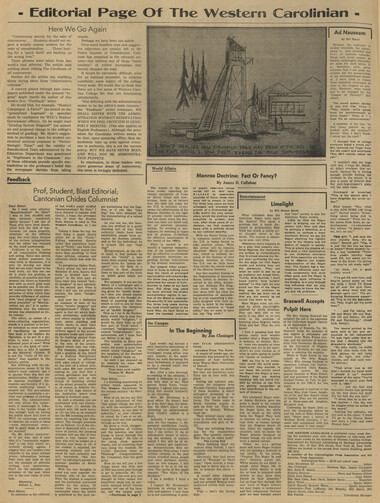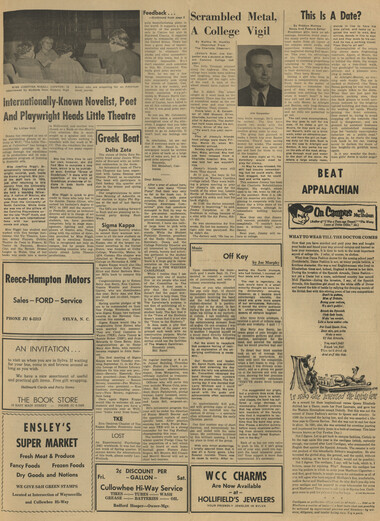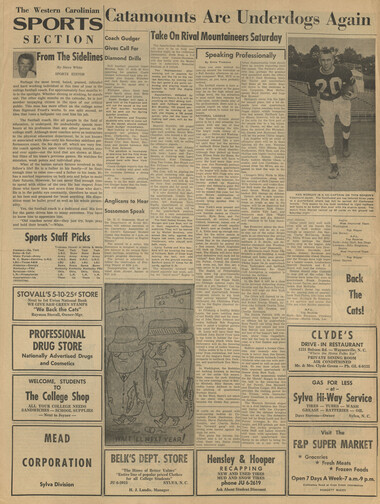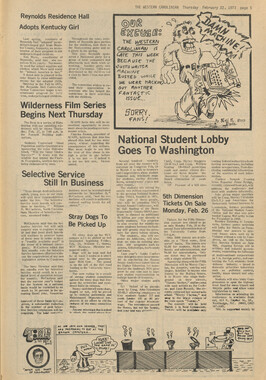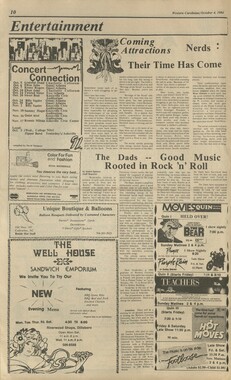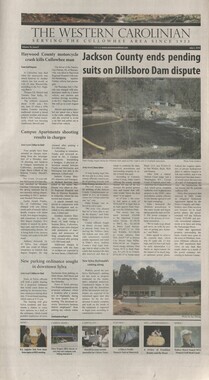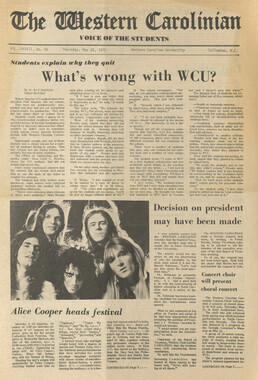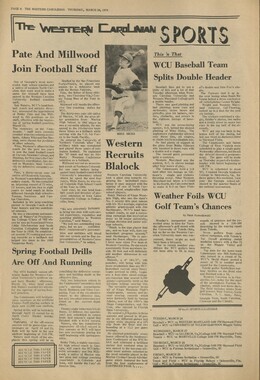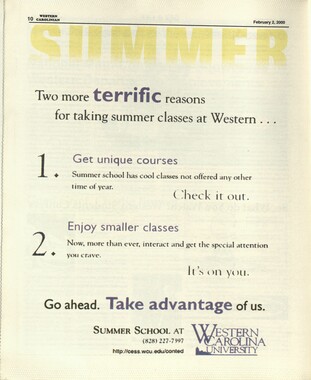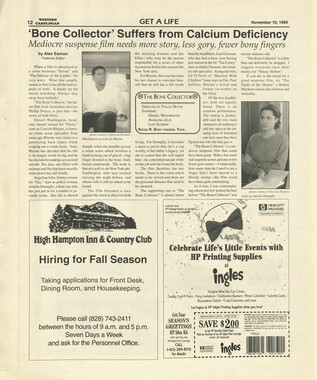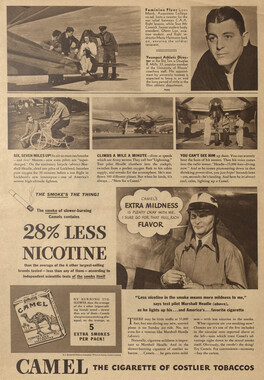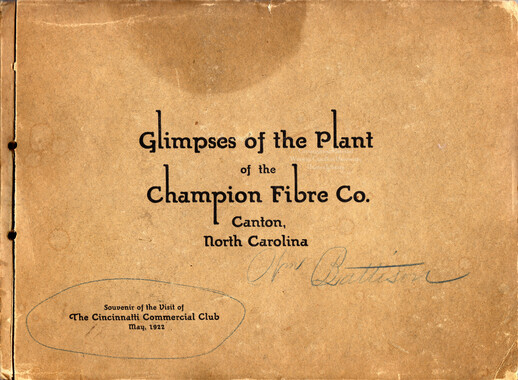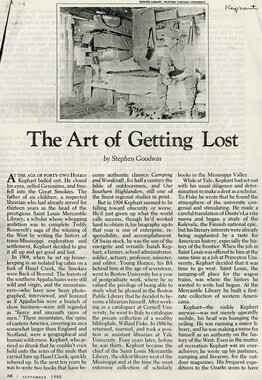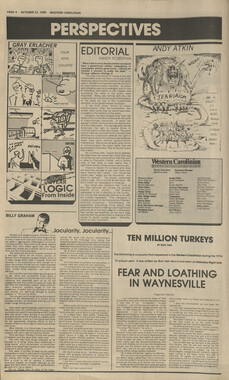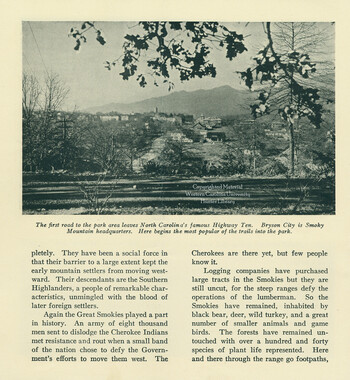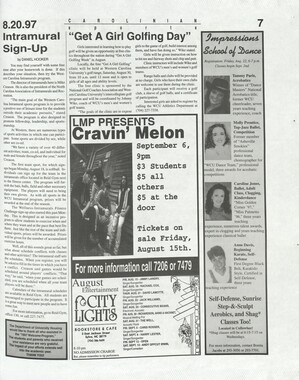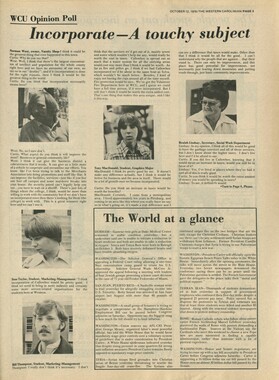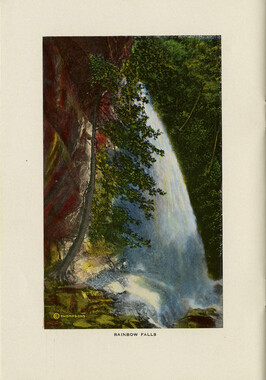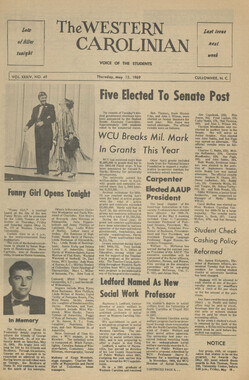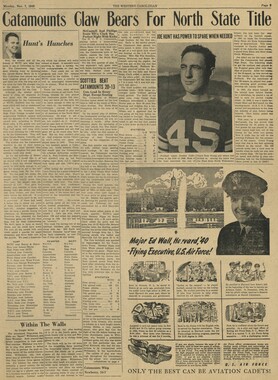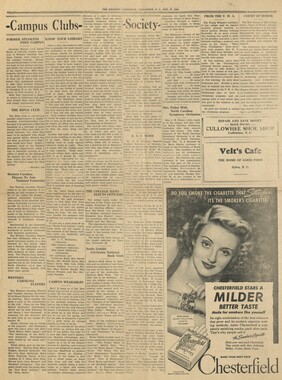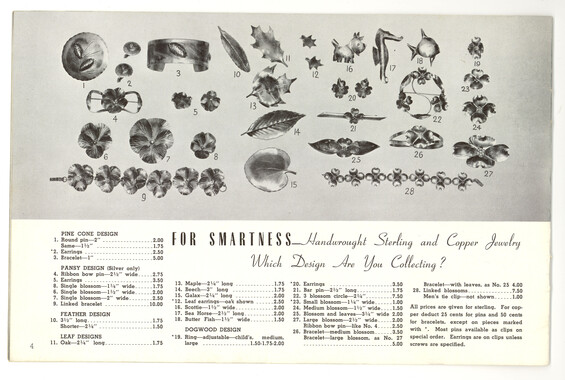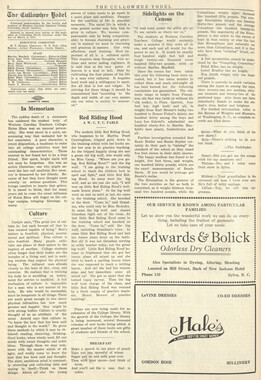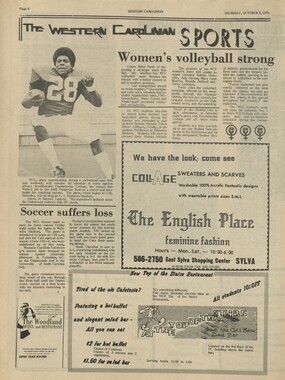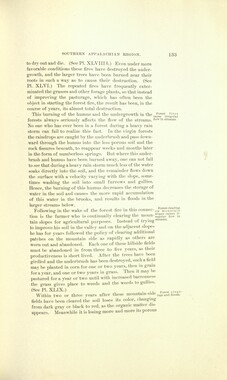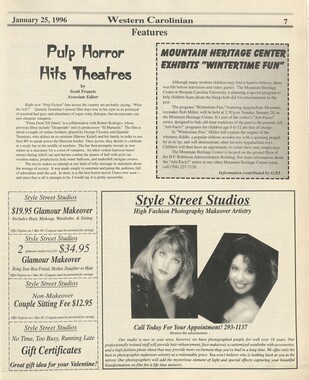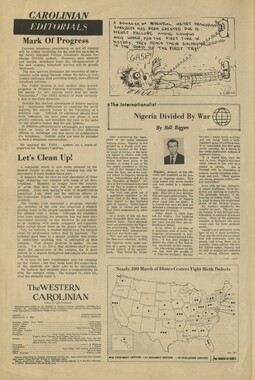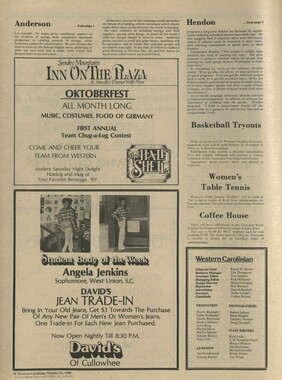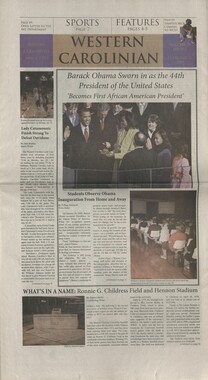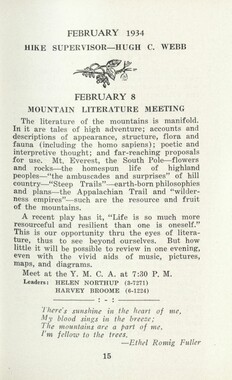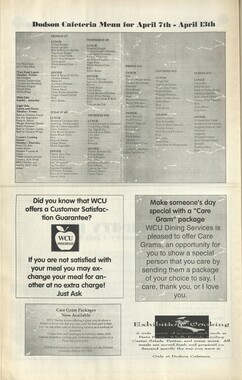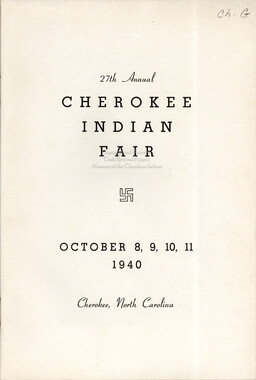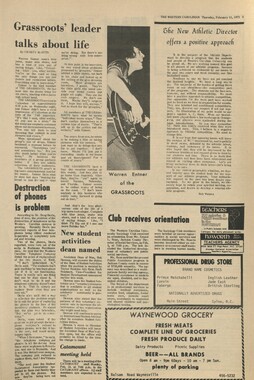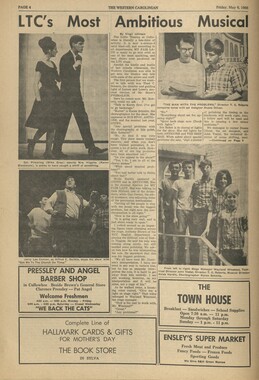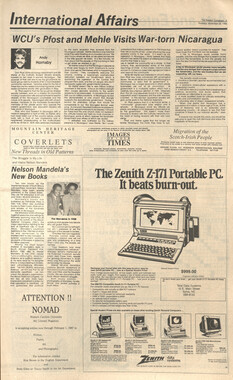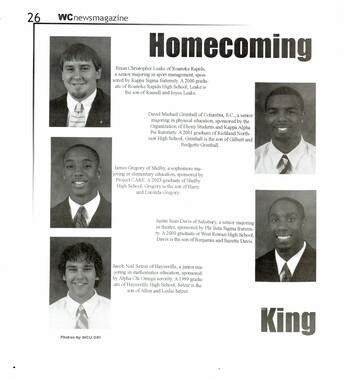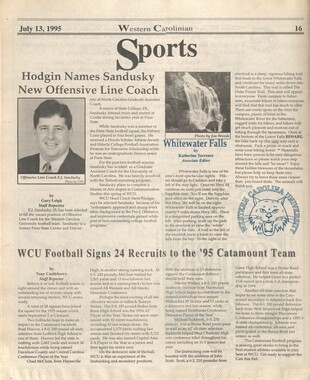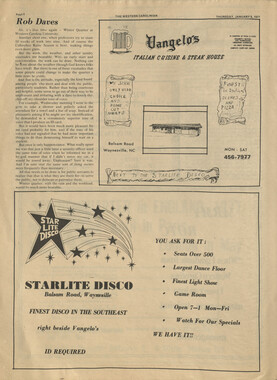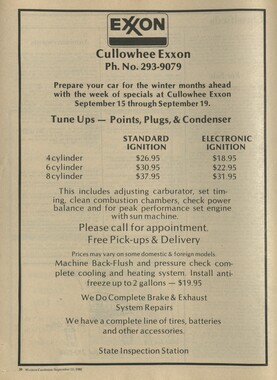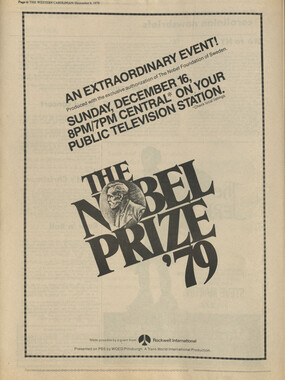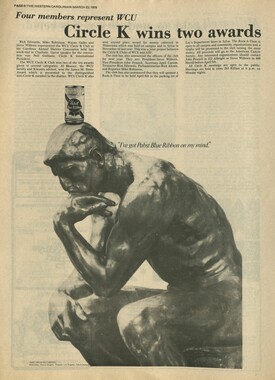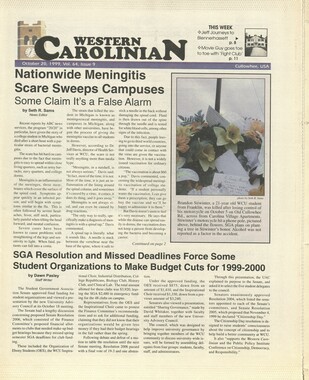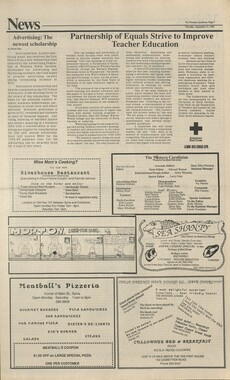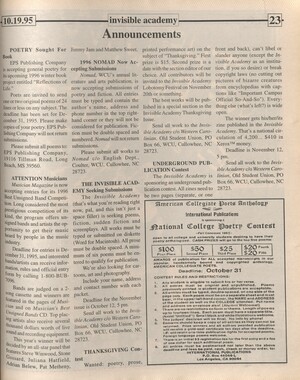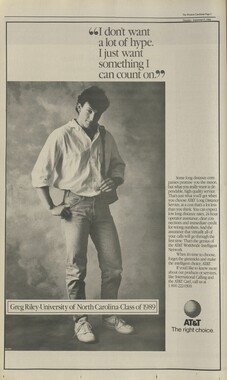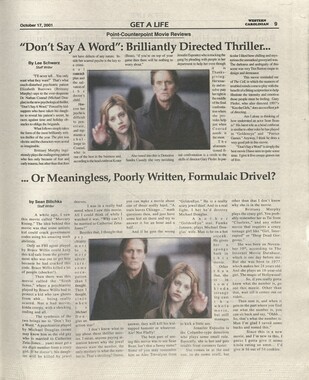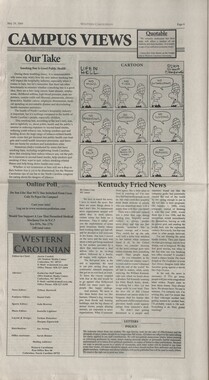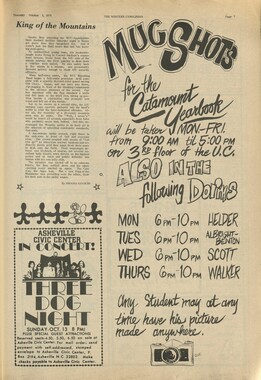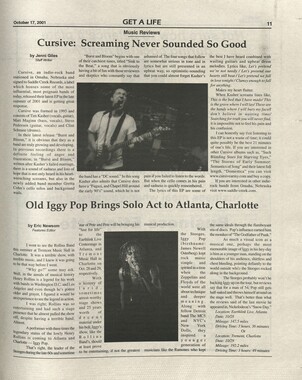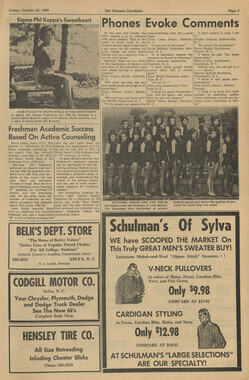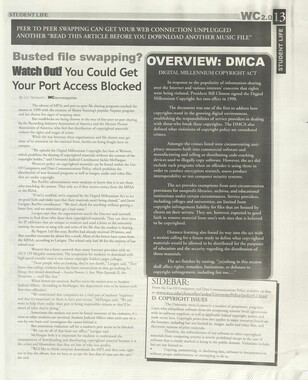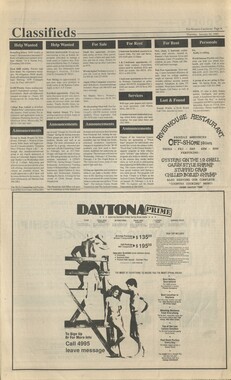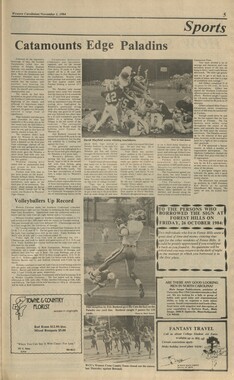Western Carolina University (20)
View all
- Canton Champion Fibre Company (2308)
- Cherokee Traditions (291)
- Civil War in Southern Appalachia (165)
- Craft Revival (1942)
- Great Smoky Mountains - A Park for America (2946)
- Highlights from Western Carolina University (430)
- Horace Kephart (941)
- Journeys Through Jackson (159)
- LGBTQIA+ Archive of Jackson County (85)
- Oral Histories of Western North Carolina (314)
- Picturing Appalachia (6873)
- Stories of Mountain Folk (413)
- Travel Western North Carolina (160)
- Western Carolina University Fine Art Museum Vitreograph Collection (129)
- Western Carolina University Herbarium (92)
- Western Carolina University: Making Memories (738)
- Western Carolina University Publications (2491)
- Western Carolina University Restricted Electronic Theses and Dissertations (146)
- Western North Carolina Regional Maps (71)
- World War II in Southern Appalachia (131)
University of North Carolina Asheville (6)
View all
- Western Carolina College (199)
- Western Carolina Teachers College (239)
- Western Carolina University (1976)
- Allanstand Cottage Industries (0)
- Appalachian National Park Association (0)
- Bennett, Kelly, 1890-1974 (0)
- Berry, Walter (0)
- Brasstown Carvers (0)
- Cain, Doreyl Ammons (0)
- Carver, George Washington, 1864?-1943 (0)
- Cathey, Joseph, 1803-1874 (0)
- Champion Fibre Company (0)
- Champion Paper and Fibre Company (0)
- Cherokee Indian Fair Association (0)
- Cherokee Language Program (0)
- Crittenden, Lorraine (0)
- Crowe, Amanda (0)
- Edmonston, Thomas Benton, 1842-1907 (0)
- Ensley, A. L. (Abraham Lincoln), 1865-1948 (0)
- Fromer, Irving Rhodes, 1913-1994 (0)
- George Butz (BFS 1907) (0)
- Goodrich, Frances Louisa (0)
- Grant, George Alexander, 1891-1964 (0)
- Heard, Marian Gladys (0)
- Kephart, Calvin, 1883-1969 (0)
- Kephart, Horace, 1862-1931 (0)
- Kephart, Laura, 1862-1954 (0)
- Laney, Gideon Thomas, 1889-1976 (0)
- Masa, George, 1881-1933 (0)
- McElhinney, William Julian, 1896-1953 (0)
- Niggli, Josephina, 1910-1983 (0)
- North Carolina Park Commission (0)
- Osborne, Kezia Stradley (0)
- Owens, Samuel Robert, 1918-1995 (0)
- Penland Weavers and Potters (0)
- Rhodes, Judy (0)
- Roberts, Vivienne (0)
- Roth, Albert, 1890-1974 (0)
- Schenck, Carl Alwin, 1868-1955 (0)
- Sherrill's Photography Studio (0)
- Smith, Edward Clark (0)
- Southern Highland Handicraft Guild (0)
- Southern Highlanders, Inc. (0)
- Stalcup, Jesse Bryson (0)
- Stearns, I. K. (0)
- Thompson, James Edward, 1880-1976 (0)
- United States. Indian Arts and Crafts Board (0)
- USFS (0)
- Vance, Zebulon Baird, 1830-1894 (0)
- Weaver, Zebulon, 1872-1948 (0)
- Western Carolina University. Mountain Heritage Center (0)
- Whitman, Walt, 1819-1892 (0)
- Wilburn, Hiram Coleman, 1880-1967 (0)
- Williams, Isadora (0)
- 1920s (57)
- 1930s (69)
- 1940s (114)
- 1950s (66)
- 1960s (314)
- 1970s (599)
- 1980s (406)
- 1990s (379)
- 2000s (282)
- 2010s (178)
- 1600s (0)
- 1700s (0)
- 1800s (0)
- 1810s (0)
- 1820s (0)
- 1830s (0)
- 1840s (0)
- 1850s (0)
- 1860s (0)
- 1870s (0)
- 1880s (0)
- 1890s (0)
- 1900s (0)
- 1910s (0)
- 2020s (0)
- Jackson County (N.C.) (2466)
- Appalachian Region, Southern (0)
- Asheville (N.C.) (0)
- Avery County (N.C.) (0)
- Blount County (Tenn.) (0)
- Buncombe County (N.C.) (0)
- Cherokee County (N.C.) (0)
- Clay County (N.C.) (0)
- Graham County (N.C.) (0)
- Great Smoky Mountains National Park (N.C. and Tenn.) (0)
- Haywood County (N.C.) (0)
- Henderson County (N.C.) (0)
- Knox County (Tenn.) (0)
- Knoxville (Tenn.) (0)
- Lake Santeetlah (N.C.) (0)
- Macon County (N.C.) (0)
- Madison County (N.C.) (0)
- McDowell County (N.C.) (0)
- Mitchell County (N.C.) (0)
- Polk County (N.C.) (0)
- Qualla Boundary (0)
- Rutherford County (N.C.) (0)
- Swain County (N.C.) (0)
- Transylvania County (N.C.) (0)
- Watauga County (N.C.) (0)
- Waynesville (N.C.) (0)
- Yancey County (N.C.) (0)
- Newsletters (510)
- Publications (documents) (1981)
- Aerial Photographs (0)
- Aerial Views (0)
- Albums (books) (0)
- Articles (0)
- Artifacts (object Genre) (0)
- Bibliographies (0)
- Biography (general Genre) (0)
- Cards (information Artifacts) (0)
- Clippings (information Artifacts) (0)
- Copybooks (instructional Materials) (0)
- Crafts (art Genres) (0)
- Depictions (visual Works) (0)
- Design Drawings (0)
- Drawings (visual Works) (0)
- Envelopes (0)
- Exhibitions (events) (0)
- Facsimiles (reproductions) (0)
- Fiction (general Genre) (0)
- Financial Records (0)
- Fliers (printed Matter) (0)
- Glass Plate Negatives (0)
- Guidebooks (0)
- Internegatives (0)
- Interviews (0)
- Land Surveys (0)
- Letters (correspondence) (0)
- Manuscripts (documents) (0)
- Maps (documents) (0)
- Memorandums (0)
- Minutes (administrative Records) (0)
- Negatives (photographs) (0)
- Newspapers (0)
- Notebooks (0)
- Occupation Currency (0)
- Paintings (visual Works) (0)
- Pen And Ink Drawings (0)
- Periodicals (0)
- Personal Narratives (0)
- Photographs (0)
- Plans (maps) (0)
- Poetry (0)
- Portraits (0)
- Postcards (0)
- Programs (documents) (0)
- Questionnaires (0)
- Relief Prints (0)
- Sayings (literary Genre) (0)
- Scrapbooks (0)
- Sheet Music (0)
- Slides (photographs) (0)
- Songs (musical Compositions) (0)
- Sound Recordings (0)
- Specimens (0)
- Speeches (documents) (0)
- Text Messages (0)
- Tintypes (photographs) (0)
- Transcripts (0)
- Video Recordings (physical Artifacts) (0)
- The Reporter, Western Carolina University (510)
- WCU Students Newspapers Collection (1923)
- A.L. Ensley Collection (0)
- Appalachian Industrial School Records (0)
- Appalachian National Park Association Records (0)
- Axley-Meroney Collection (0)
- Bayard Wootten Photograph Collection (0)
- Bethel Rural Community Organization Collection (0)
- Blumer Collection (0)
- C.W. Slagle Collection (0)
- Canton Area Historical Museum (0)
- Carlos C. Campbell Collection (0)
- Cataloochee History Project (0)
- Cherokee Studies Collection (0)
- Daisy Dame Photograph Album (0)
- Daniel Boone VI Collection (0)
- Doris Ulmann Photograph Collection (0)
- Elizabeth H. Lasley Collection (0)
- Elizabeth Woolworth Szold Fleharty Collection (0)
- Frank Fry Collection (0)
- George Masa Collection (0)
- Gideon Laney Collection (0)
- Hazel Scarborough Collection (0)
- Hiram C. Wilburn Papers (0)
- Historic Photographs Collection (0)
- Horace Kephart Collection (0)
- Humbard Collection (0)
- Hunter and Weaver Families Collection (0)
- I. D. Blumenthal Collection (0)
- Isadora Williams Collection (0)
- Jesse Bryson Stalcup Collection (0)
- Jim Thompson Collection (0)
- John B. Battle Collection (0)
- John C. Campbell Folk School Records (0)
- John Parris Collection (0)
- Judaculla Rock project (0)
- Kelly Bennett Collection (0)
- Love Family Papers (0)
- Major Wiley Parris Civil War Letters (0)
- Map Collection (0)
- McFee-Misemer Civil War Letters (0)
- Mountain Heritage Center Collection (0)
- Norburn - Robertson - Thomson Families Collection (0)
- Pauline Hood Collection (0)
- Pre-Guild Collection (0)
- Qualla Arts and Crafts Mutual Collection (0)
- R.A. Romanes Collection (0)
- Rosser H. Taylor Collection (0)
- Samuel Robert Owens Collection (0)
- Sara Madison Collection (0)
- Sherrill Studio Photo Collection (0)
- Smoky Mountains Hiking Club Collection (0)
- Stories of Mountain Folk - Radio Programs (0)
- Venoy and Elizabeth Reed Collection (0)
- WCU Gender and Sexuality Oral History Project (0)
- WCU Mountain Heritage Center Oral Histories (0)
- WCU Oral History Collection - Mountain People, Mountain Lives (0)
- Western North Carolina Tomorrow Black Oral History Project (0)
- William Williams Stringfield Collection (0)
- Zebulon Weaver Collection (0)
- College student newspapers and periodicals (1951)
- African Americans (0)
- Appalachian Trail (0)
- Artisans (0)
- Cherokee art (0)
- Cherokee artists -- North Carolina (0)
- Cherokee language (0)
- Cherokee pottery (0)
- Cherokee women (0)
- Church buildings (0)
- Civilian Conservation Corps (U.S.) (0)
- Dams (0)
- Dance (0)
- Education (0)
- Floods (0)
- Folk music (0)
- Forced removal, 1813-1903 (0)
- Forest conservation (0)
- Forests and forestry (0)
- Gender nonconformity (0)
- Great Smoky Mountains National Park (N.C. and Tenn.) (0)
- Hunting (0)
- Landscape photography (0)
- Logging (0)
- Maps (0)
- Mines and mineral resources (0)
- North Carolina -- Maps (0)
- Paper industry (0)
- Postcards (0)
- Pottery (0)
- Railroad trains (0)
- Rural electrification -- North Carolina, Western (0)
- School integration -- Southern States (0)
- Segregation -- North Carolina, Western (0)
- Slavery (0)
- Sports (0)
- Storytelling (0)
- Waterfalls -- Great Smoky Mountains (N.C. and Tenn.) (0)
- Weaving -- Appalachian Region, Southern (0)
- Wood-carving -- Appalachian Region, Southern (0)
- World War, 1939-1945 (0)
- Text (2491)
- MovingImage (0)
- Sound (0)
- StillImage (0)
Western Carolinian Volume 28 Number 03
Item
Item’s are ‘child’ level descriptions to ‘parent’ objects, (e.g. one page of a whole book).
-
-
- Editorial Page Of The Western Carolinian - Here We Go Again "Controversy merely for the sake of controversy . . . Students should not expect a weekly expose written for the sake of sensationalism . . . Those looking for a 'quick thrill' are barking up the wrong tree." These phrases were taken from last week's lead editorial. The article said nothing about ridding The Carolinian of all controversy. Neither did the article say anything about shying away from "constructive criticism." A cursory glance through past newspapers published under the present "regime" might startle the author of this week's first "Feedback" letter. He would find, for example, "Student Campaigns: A Farce?" (an attack on the "generalized hogwash" in speeches made by candidates for WCC's Student Government offices). Or he might read "Grading System Illogical?" (an assault on and proposed change in the college's method of grading). Mr. Hyde's suggestion to purchase a barn for student use received satirical comment in "Partner Swingin' Time;" and the validity of Standardized Tests administered by the Education Department was questioned in "Nightmare in the Classroom." Any of these editorials provide specific contradiction to the professor's belief that the newspaper shrinks from taking stands. Perhaps we have been too subtle. Over-sized headline type and suggestive adjectives are usually left to the Police Gazette or Confidential. Criticism has remained in the editorial column—but without any of those "extra touches" of yellow journalism that merely cheapen the copy. It would be extremely difficult, even for an habitual pessimist, to criticize justifiably some aspect of the college every week. We would like to think that there are a few areas of Western Carolina College life that are functioning satisfactorily. "Not differing with the administration seems to be the editor's main concern," the "Feedback" writer continues. WE SHALL DIFFER WITH THE ADMINISTRATION WITHOUT RESERVATION WHEN WE FEEL CRITICISM IS GENUINELY MERITED. (This also applies to English Professors.) Although the precedent for Carolinian writers seems to be that, upon assuming office, they immediately take up arms against everyone in authority, this is not the current policy. BUT WE HAVE NEVER BEEN, AND WILL NOT BE, ADMINISTRATION PUPPETS. In conclusion, to those readers who crave generous doses of controversy, this issue is lovingly dedicated. Feedback Prof, Student, Blast Editorial; Cantonian Chides Columnist Dear Editor: As I read your editorial "Sensationalism? No Dice!" I was at first shocked and then seriously concerned,. partly because I am one of those who have been dissatisfied with the lack of controversy (or more properly, criticism) on the editorial page but even more because of the curious interpretation that the editor has imposed on the word controversy. Criticism is at the center of all constructive thinking and acting. Since one person alone seldom possesses the total truth in discussion, it is only by sharing our ideas that we can come closer to the total truth. All that one can do is study the problem as carefully as possible and then present his views as honestly and with as much good taste as he possibly can. If the editor confuses this sincere presentation of ideas which may provoke difference of opinion with "mud slinging" or "personal prejudice" or "Machiavellian hot air," it is understandable why the editorial column has stimulated so little interest. The editor, as center of a news-collecting organization, stands in a position to be better informed on most matters of significance on campus than most of his readers do. Therefore, is he not in a position to state a reasonably informed point of view? What he says is this kind of viewpoint; that is why it appears in the Editorial Column. It is not the "voice of the students;" that appears in the Letters section. Not differing with the administration seems to be the editor's main concern. Am I to assume from this that our aministration dislikes or even opposes intelligent discussion—particularly if it involves conflicting views? I suspect not. The pre-session conference is essentially a review and criticism of existing policies. The administration not only allows this conference; it encourages it. Likewise, is the "public image of this college" hurt by letting the public know that here at WCC we encourage students to consider the world of ideas —even controversial ones— and to apply them to practical matters? No, Mr. Editor, controversy is not bad, and if your idea of a "reasonable suggestion" is one with which everybody already agrees, I suggest that you confine your remarks to the news column where information belongs. Poor taste and lack of tact are the enemies of editorial writing, not controversy. Don't let the mistakes and extremes of the past blind you to the real value of your task. Sincerely, Robert L. Parr Dear Editor, In reference to the editorial of last week's paper entitled "Sensationalism? No Dice," I have decided to explain with clarity, I hope, the prevalent idea of what the Student Body desires to read in The Western Carolinian, as I see it. Taking it from the top, the first thing a paper should strive for is the "Truth." Falling somewhat directly under that precarious heading of "Truth," one finds that the Student Body would like, more than anything, to read those articles, columns and editorials which deal with the truth. To paraphrase Ogden Nash, "Every school boy and every Bachelor of Arts, knows that truth is divided into two parts." In the first part we have what was termed "public imagery" in said editorial. In the second part there is what I will use, for practical reasons, the term "enlightenment." And now for a definition an example of each of the terms, "public imagery" and "enlightenment." Public imagery is that art which business enterprises, individuals and others employ to further their social standing and which shows to what limit their authority is extended, without regard to the person or persons under said authority by building around them an imagery shield of purity, in the eyes of the people, behind which they can hide. For example, suppose you hold a position on the board of a Judicial Disciplinary Counsel which is affiliated with some school or college. At the start of a school year, with some 600 new students coming in, you find that a certain gentleman has been brought before you on the charge of imbibing alcohol on the school property, which is, of course, in definite violation of the high morals of the institution where even kissing is frowned upon. In such a situation you are confronted with two alternatives, either: (1) dismiss the student with 100 work hours, or (2) use him as an example for the 600 incoming new students by expelling him from school. The thought processes are as follows: (1) if the student is dismissed with a sentence of justice, the incomng students will see that if they break a rule (minor law'; they also will be judged on a likewise just basis, or (2) if the student is expelled, the incoming students will be awed by such authority and will henceforth "fall into line" by refusing to pursue the national pastime of Social Drinking. With the two thoughts in mind you next consider the business side of the story. Thus the student is expelled and the institution concerned profits by the action. Of course you are completely exonerated when the article is published in the local pa per exclaiming that the fugitive, or if you like, "mad dog," has been dismised for the dismembering of a valued morality. As you can see, the business has profited in a social standing sort of way, their authority limits have been established, people have accepted the decision (shield), and as for the individual, he is treated like any "mad dog." Enlightenment, on the other hand, is that process by which the "shield" is torn down from around those who would strive for "public imagery," i.e., the facts of a situation in their simplest form or that part of the truth on which great ideals are based. For example, if you are the Editor of a newspaper and a situation arises, similar to the one given for "public imagery," then you should expose both sides of the thought instead of exposing only that which is told to you by those who practice the deceptive art of "public imagery." Thus as I see it, the Student Body would like to read that which would "enlighten." It would be sheer folly to call that part of Truth which I t ermined "enlightenment," a termed "enlightenment," sensationalism, and I trust that our Editor is no fool. The question is: Have you within your authoritative limits, the power to print that which would "enlighten" us, the members of the Student Body? I hardly think so. As until I am exposed as an example for some 600 Freshmen, I remain . . . Your most avid reader Thomas W. Smith Dear Editor, I a mwriting concerning an article which appeared in The Western Carolinian in the column entitled "As Nauseam." First of all, let me say that I am an inhabitant of that "last quaint village one travels, with the exception of the Dutch Colony, as one goes to Asheville," as your columnist stated. So I am at an advantage over one just passing through as he was. He gives a vivid, exaggerated description of Canton, and the miseries one must forego to travel through this "quaint village." He tells of the smog, stink, gaseous clouds, and of numerous beer cans along the roadside. He vividly describes these as ("flowery." Congratulations, Mr. Columnist, that was good print. Now let me tell you a few things about this little spot of Hell one must pass through to get to Asheville. Mr. Col umnist, did you ever give any thought to what caused that hazardous smog you so narrowly escaped alive? Canton possess, not one of the largest, but the largest paper —Continued to page 3 ,————-———-------—-^—————^*^———-—-—---—-----—————--———-—---ifflnnnnnnnnnnif-------------------in-ir—-------- irnur—" World Affairs Monroe Doctrine: By James D Fact Or Fancy? Callahan The events of the past three weeks, regarding the virtual occupation of Cuba by Soviet troops and technicians, leads us to believe that the time has come for the U.S. to seriously re-examine the effectiveness of the Monroe Doctrine in the light of present world conditions. For too many years the doctrine has been out-dated and, for all practical purposes, useless. Its wording is ambiguous; its meaning is vague and its purpose ill-defined for effective employment in the world of the 1960's. What is needed is not merely a vigorous reasserta- tion of the present doctrine but an effective re-statement of American intentions regarding foreign intervention in the western hemisphere. Our present bitter experience in Cuba is nothing more than the result of prolonged equivocation and compromise. For three long years we have permitted the cancer of Communism to fester at our back door. For three long years we have allowed the erratic revolutionary regime in control of the island to endanger the security of two continents. For three long years, during the most crucial period of the Cold War, we have failed to heed the repeated warnings of expert observers whose words fall on deaf ears. Branded as pessimistic prophets of doom, these men were left to preach in vain. For three long years we have witnessed and tolerated the growth of a Communist satellite within the very hemisphere which the doctrine was conceived to protect. And now, after three years of Indecision, we find ourselves faced with a definite threat to our national security. With the Soviet Union now in complete control of Cuba the U.S. is being forced to take positive action. What this action will be remains uncertain. Short of all-out war, which is unlikely because of the basence of vital Russian interests in Cuba, the U.S. can do little more than invoke the sterile words of the Monroe Doctrine. Our fair-weather friends in the Organization of American States refuse to become involved in the crisis. Accepting our Alliance For Progress funds with one hand they shun with the other the responsibilities of maintaining or even supporting a doctrine designed with their security in mind. In the meantime we continue to "tread softly," but we seem to have lost our "big stick." Entertainment Limelight by Bill Shawn Smith On Campus In The Beginning By Jim Cloninger Last week's rag Carried a very conclusive description of "our" editorial policy. Our Intelligent young editor was very concise, to the point. When we were discussing the issue beforehand, it appeared to be a staunch belief that merited thought. But, after a very thorough re-reading of the editorial, I found a reference to a person very dear to me. That person being Yours Truly! Imagine, I agreed with something that slanted indirectly in my direction. Now, Mr. Streetman is a good editor. He doesn't beat us if we don't meet the deadline. He didn't object to my obtaining an advertisement from Clyde's (which is a first). Actually, I write this column for two reasons: 1) My personal satisfaction (really, I'm trying to convince myself that I can write); 2) As an informative means of advising the students of matters which I feel will be of utmost interest and controversy. Sensationalism does not encompass these areas. I have written columns in the past which attacked issues, people and other pertinent institutions on this campus. I will continue to do so in the future. The motto of this paper remains "The Voice of the Students." I am a student. I have a voice. I respect Mr. Streetman's fortitude in stating his beliefs and policies. I only hope he is not succumbing to pres sure from administrative forces. Intruders From The North A couple of weeks ago, our fraternity was honored by the presence of four brothers from Wayne State University of Detroit. Four great guys, no doubt! But they are absolutely nuts! They are in love with this place. During our national convention, the delegates from Western Carolina were guests of these invaders. A minor deflugalry prompted us to return with one of their vehicles. The Yanks came to North Carolina merely to pick up their car. They returned to Detroit. Without their car. They utilized many adjectives to describe the scenery, friendliness and girls of W- CC. They are returning Saturday for the Appalachian game. The question remains, Will the car be taken back? The Living End While babbling about our visitors from Detroit, I can't conclude without relating this incident: Obviously, they had never heard of "Weejuns" or "Gold Cups." Upon arrival, a shopping trip to Sylva was in order to procure the above i- tems. A recent letter informed me that one green gold cup and one pressed Weejun were enshrined within their scrap- book. Y'all — that's the Living End. What influence does the American Negro have upon the theatre? This poses a problem that is much discussed in metropolitan New York but which is rarely even thought about in the South. The answer is simple: up to now, very little. Whenever there happens to be a play that possibly contains Negroes, the characters are written so unrealistically that It almost shames the Negro actor portraying the role. On the stage we find Negro maids and butlers; they are the stereotype. They are what we want to see; we as an audience can accept them. "Lordy, Miss Scarlett, I don't know nothin' 'bout burstin* babies!" In this light we may avoid our fear of the Negro; they pose no problem, no conflict. We see them not as they are, but merely as we would like them to be. Most Negro roles are created by white playwrights, directed by white directors. This can only add to the myth; it can offer us no real truth to the problem of knowing what Negroes really think and feel. They do, you know! I find it amazing how few people really ever wonder wonder what a Negro thinks, or endures, or dreams. Never were two peoples so close together and yet so far apart. Aren't we ever curious as to what is really going on inside our "maids or butlers?" Still we live in an unrealistic world. We avoid problems until they explode in our faces. We cannot avoid the Negro; the Negro is heri. Finally they are making headway into the world created by whites; at last they are gaining recognition as vital contributors to the culture of America. The renowned Negro writer James Baldwin gave me quite a shock in his current best-seller, Another Country; the Negro hates the white just as much as the white hates the Negro! They hate us because we refuse to accept them as human beings; they are Negroes above all else. Unles we remedy this situation, until we know the Negro peoples foremost as human beings, we will never have a united culture. Today we are getting more and more Negro writers who are gaining a foothold in our society. In his article, "Theatre: The Negro In and Out," Baldwin points out, White people do not know e- nough about Negro life to know which details to look for, or how to interpret such details as may have been forced on their attention." Let us hope that through this new wave of Negro authors we may begin to understand and feel compassion. Perhaps now we may become aware that "our" society is also the American Negro society. Little by little the Negro actor is slipping out of his janitor role. Now and then he portrays a detective, or a student, or perhaps a town merchant. Slowly we see the Negro attaining his rightful place in the theatre and his station of respect in society. This is where the theatre offers such a vital contribution to our existence; television and films especially are helping to dissolve our biased, misconception of the Negro race. The theatre has a tremendous influence upon our lives, occasionally bad, more often good, and the Negro Is acquiring more Influence in the theatre. It is only through this influence that we may really come to know the Negro and Ma problems. Braswell Accepts Pulpit Here The Rev. George Braswell has accepted the call to the pastorate of the Cullowhee Baptist Church as of September 9. A native of Emporia, Va., Mr. Braswell holds the bachelor of arts degree in philosophy and history from Wake Forest College, and the bachelor of divinity from Yale University. He attended the University of Virginia School of Medicine for one year prior to entering the ministry. While at Wake Forest he was named to Phi Beta Kappa, "Who's Who Among Students in American Colleges and Universities," Omicron Delta Kappa, leadership society. He also played baseball at Wake Forest, and was president of the Baptist Student Union. At Yale, he participated in the YMCA for two years. Mr. Braswell is married to the former Miss Joan Owen, daughter of Dr. and Mrs. Robert Owen of Canton. They are the parents of a three-year-old daughter, Margaret Ann. Confessing he knew little a- bout the mountains before he met his wife at Wake Forest, he said, "Since she's a native of Western North Carolina, I became well acquainted with this area and enjoy it very much." Ad Nauseam By Bill Raoul Because the cafeteria is doubly crowded, the atmosphere is also crowded and full of hurried remarks These will never appear in famous anthologies especially set aside for such trivia, it is, therefore, with great pleasure that I set aside my column for the preservation of the aforementioned slander. I have tried to repeat these immortal utterances as close to the original as possible. However, some words had to be changed for the "League of Decency" and others. The sound system started to pop and hiss. Voice 1: "Hey, maybe we're gonna have an announcement or some music." Voice 2: " | hope it's an announcement." A member of the line: "Is that sauce poured on, or cooked with the chicken?" Server: "Gee, I don't know. I never eat the stuff." "I thought that at college everyone dated a whole lot." She removed her finger from the left nostril and continued: "But ain't nobody asked me yet." "I wouldn't slop my hogs with this. I hope Mr. Mitchell didn't overhear that remark, because he is having enough trouble feeding the students in the school. It is also a point of interest that the anti-hog-slopper's plate left the table clean. Overheard at breakfast: "This is the second time I have forgotten my silver today." First beanie: "Hey, what is this ADD NOSE AM thing- say?" Second beanie: "Something about being sick to your stomach." From the table across from them, an up- perclassman c o ndescended this advice: "It doesn't matter, he's an ass." Ffrst girl: "I Just love the new laundry here, it's so clean." Second girl: "Yes, It is just like the one we have at home." From anothei—to ble, a boy muttered: "Them blue plastic laundry baas wask OK, but watch out for them in the dryer. I'm telling you, they're not made right." "At lease, it's a good healthy sound." "I've got PE next hour, and they're gonna make us run the mils> I think I'll throw up all over the gym floor, just to show them that my stomach can't run." The all- knowing Sophomore answered: "Try to hit the instructor, too. They might get the point then." ". . . and I'm taking Art 130 and Music 130 and English 151 and History 151 and PE and Psychology." (Good luck, honey.) The beanie pointed to the table next to her and announced to her companion: "It was right under that table that I stepped into the strawberry shortcake." "No joke, really, he walks into the class room with his dark glasses on and turns out the light, and talks." (Listen, and wait until winter arrives.) "That silver was so hot that I burned my hand when I picked it up." Another member of the table: "You're supposed to warm your food with it, idiot." ". . . and she had long beautiful brown hair growing all the way down her back. It's too bad she was bald." "I think that he is the cutest teacher. I like the way he wiggles when he writes on the board." Leaving the cafeteria, one boy said to the other: "I think I'll go to the Towne House and have a Coke and some French fries." THE WESTERN CAROLINIAN is published every week during the academic year with the exception of mid-term and final exam weeks by the students of Western Carolina College. Represented for National Advertising by National Advertising Service, Inc., 18 East 50th Street, New York 22, New York. Offices are located in the second floor Joyner Building, phone 293-2312. A member of the Intercollegiate Press Association and the Carolina Press Association. Subscription Rate — $2.00 per school year John Streetman III Editor Jim Cloninger Business Mgr., Senior Columnist Mrs. Ruth K. Nelson Advisor Roberta Morrow News and Feature Editor Billie Jean Barnes Copy Editor Ella Jane Cabe, Joan Davis, Robert Davis Reporters Steve White Sports Editor David Howell, Howard White Sports Reporters Columnists—Tom LeMieux, Jac Murphy, Bill Raoul, Bill Shawn Smith, John Stovall. Bob Parrish Circulation Manager
Object
Object’s are ‘parent’ level descriptions to ‘children’ items, (e.g. a book with pages).
-
The Western Carolinian is Western Carolina University’s student-run newspaper. The paper was published as the Cullowhee Yodel from 1924 to 1931 before changing its name to The Western Carolinian in 1933.
-
